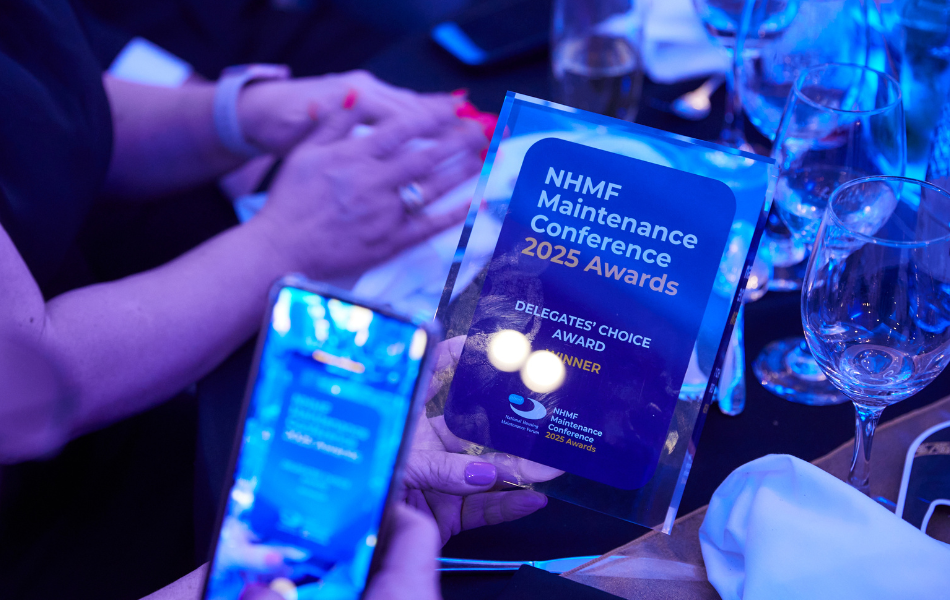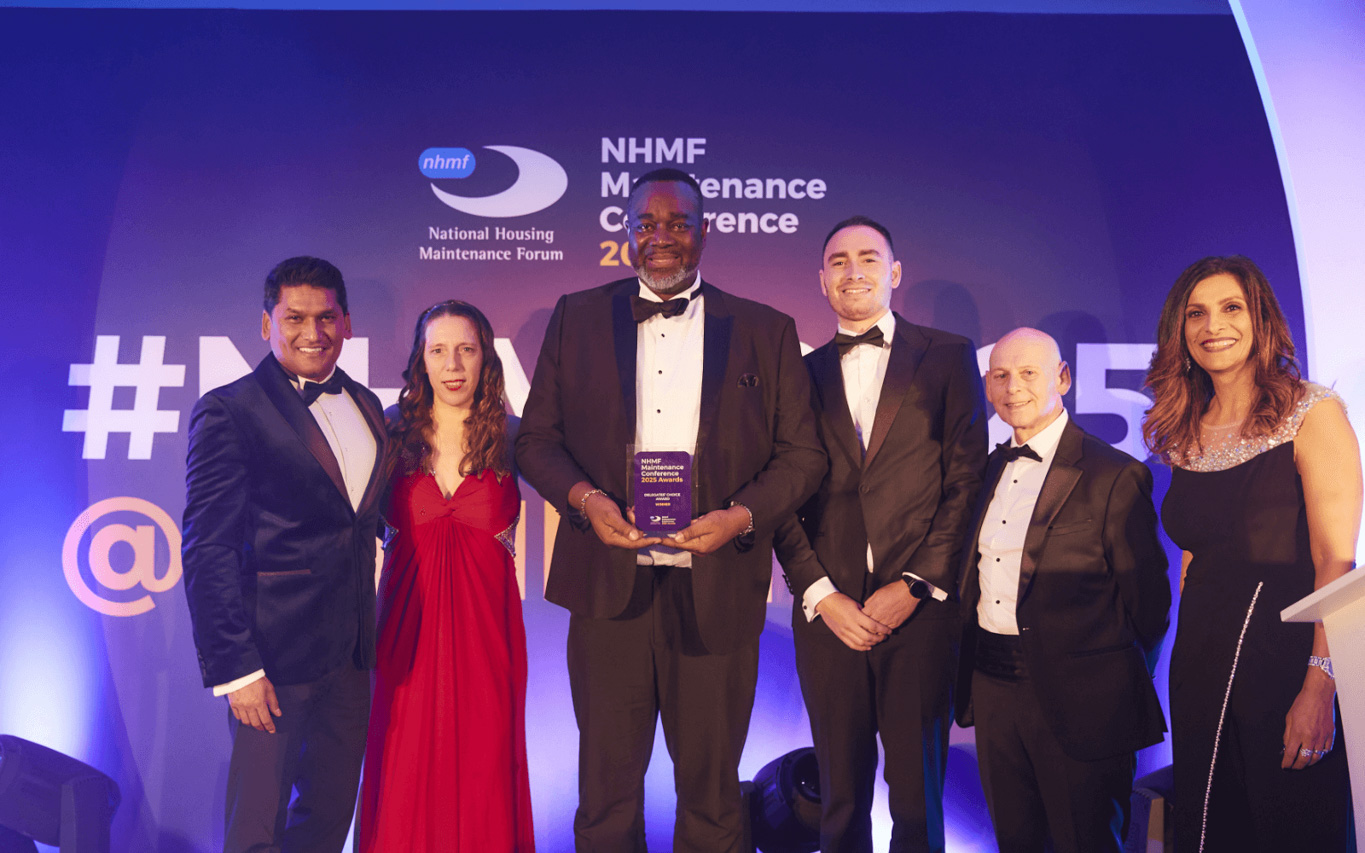NHMF Awards 2025: Most Innovative Property Service - Shortlist
What can the sector learn?

Shortlisted projects
Abri Homes commissioned Crystal Clear to repair rather than replace failed double-glazed window units.
Progress Housing is working with Voicescape to be forward-thinking in its approach to statutory maintenance requirements that is efficient, engaging and customer-focused so that its homes are of the highest quality.
Southern Housing – The George Downing Estate project, completed in August 2024, involved replacing flat roofs on two high-rise residential buildings in Hackney so that the homes would meet the latest building safety requirements and improve their energy efficiency. Its location posed a challenging situation for safe access for the works.
Wokingham’s Grovelands Park Redevelopment used advanced volumetric modern methods of construction (MMC) to replace an outdated mobile home site with 22 energy-efficient 2-bedroom modular homes, featuring modern living facilities.
What is innovative about and what was achieved with these projects?
Abri Homes – Crystal Clear’s innovative and unique process renovates failed double-glazed units that would otherwise be scrapped, saves significant costs, and reduces Abri’s carbon footprint.
Progress Housing - Voicescape combines automation technology, behavioural insights, and data science to create bespoke communication solutions that help drive substantial operational efficiencies and service improvements for social landlords. This partnership is tackling the costly and growing issue of no-access by enabling Progress to engage with its customers in a meaningful way to deliver its gas servicing programme.
Southern Housing – An innovative scaffolding solution was required to minimise risks to the adjacent railway line and the scaffold was re-engineered to limit the construction area to a single elevation opposite the railway line. It was critical to comply with the latest Building Safety Regulations and the project involved rigorous safety procedures, including a plate load test to ensure structural integrity and the use of Monarflex sheeting to minimise visual disruption to train drivers.
Wokingham selected a MMC approach to meet urgent housing needs for homeless families both quickly and sustainably. It reduced build time by up to 50% compared to traditional methods, significantly lowering on-site carbon emissions, waste, and costs. The composite wall materials provided highly insulated, fire-resistant, and durable homes, ensuring safety and comfort without aesthetic compromise to achieve an EPC rating of A. It incorporated the Automist fire suppression system that uses targeted water mist, activated by heat detectors, consuming 10 times less water than traditional sprinklers, enabling rapid response and improved fire safety. The double-stacked modular design maximised the site, doubling its capacity, addressing high housing demand. Integrating air source heat pumps, solar panels, and smart battery storage systems made the development self-sustaining and capable of selling surplus energy back to the grid, enabling the entire site to function as a smart micro-generation plant, these systems both supported council funding and ensured residents benefitted from energy-efficient homes with significantly reduced utility bills.
What are the measurable benefits to the client, the contractor, the resident, and the neighbourhood?
Abri Homes – Repairing rather than replacing failed double-glazed window units provides a much-improved experience for tenants by delivering:
- First-Time Fix so that work completed in just one visit rather than 2 visits for a replacement (often become 3 or 4 visits).
- Working from the outside so that tenants do not to wait in and have their day unhindered.
- Can also work from the inside where necessary, such as when high rise blocks are involved.
- Improved thermal performance – process restores the thermal efficiency of a unit same level as a non-failed unit.
- Wider community and social value through using a more sustainable and environmentally friendly way of working to reduce Abris glass waste by 120 tonnes and its CO2 footprint by 130 tonnes so far.
Progress Housing and Voicescape have worked collaboratively to develop an innovative solution that transforms how maintenance appointments by reengineering the way in which the organisation engages with customers during the gas servicing programme. Before it attempted to manually call each customer before their appointment, while sending one-way text messages that had little impact on engagement. Inbound enquiries went to a general advice line, resulting in lengthy call times and no guarantee of a resolution. Voicescape Compliance has created an intelligent, resident-centric engagement process, with automated appointment booking, confirming and rescheduling technology that involves tenants in the appointment scheduling process so they feel engaged and empowered – leading to a better customer experience and outcomes. This not only ensures compliance but is a customer-centric approach, improving first-time access. Saves the time and costs of rearranging visits and engineers having to return.
Southern Housing – Project’s measurable benefits included enhanced building longevity, durability, and thermal efficiency (improved living conditions and lower energy bills), while reducing future maintenance costs. It complied fully with BSR requirements, protecting Southern from potential legal and regulatory issues and reduced risks of structural failures or leaks. It was delivered within budget and on schedule. Buildings’ improved exteriors provide a more pleasant visual living environment, enhancing residents’ satisfaction and pride in their homes. Careful planning and execution, particularly the measures taken to protect the adjacent railway line, ensured the safety of the broader community. The project supported local employment and invested in the community’s infrastructure, fostering economic growth and stability.
Wokingham – The project enabled the Council to provide enhanced service delivery by significantly reducing reliance on costly out-of-borough bed and breakfast accommodation, leading to annual savings of approximately £1 million. Faster MMC construction minimised on-site disruption and carbon emissions. The advanced energy systems lowered long-term maintenance needs and enabled revenue generation from surplus energy sales to the grid. Residents benefitted from energy-efficient homes with significantly reduced utility bills, improved fire safety, and modern living standards, high-speed internet for educational and work-from-home needs. A standout element of the project was the innovative partnership with the Royal Berkshire Fire and Rescue Service to develop a fire-proof battery storage system. The project revitalised the area by replacing old, unattractive housing with modern, eco-friendly units to improve neighbourhood aesthetics with new street lighting and improved estate layout reducing anti-social behaviour. The redesigned car park, featuring EV charging bays, benefitted residents and the wider community by promoting sustainable transport. Environmental measures, including site decontamination and SuDS, and the upgrade of the site sewage pumping station to accommodate increased site capacity supported ecological health, while the retention of TPO-protected trees showed a commitment to environmental stewardship. Social value included cost savings reinvested into local services, maintaining school placements, and preserving local support networks for homeless families.
What are the financial costs and measurable cashable benefits over a defined time period?
Abri Homes – The measurable cashable benefits to client Abri are 4-fold:
- Cost saving to date more than £219,000 or 47% compared to the cost of replacement.
- 120 tonnes of waste glass saved from landfill.
- 130 tonnes reduction in Abri’s carbon footprint (equivalent to family size vehicle traveling 393,000 miles).
- First-time fix repair reduces historic repair costs.
Progress Housing - Since forming the partnership, no-access rates have reduced by 23% In one month, an additional 40 appointments carried out first-time due to improved customer engagement. Customer satisfaction for communication on gas servicing has increased to 99.5% between July and September 2024, providing an average for 2024 of 97.9%. The reduction of no-access rates, maximises the value of officers’ and engineers’ time, enhances effectiveness and job satisfaction. It reduces vehicle fleet costs by cutting out unnecessary miles. The average cost per no-access visit is between £75 and £100. It is further ahead with its gas servicing programme, compared to previous years. This will allow engineers to focus on responsive repairs and emergency call-outs in the critical winter period. The key moving forward is to use Voicescape’s real-time data to ensure the system continues to be refined and the services remain efficient, cost-effective, and customer-centric. The partnership has also decreased unnecessary costs, such as manual customer service rebooking (typically 10 minutes, costing £2.91). Reduced CO2 emissions (av. 15.49 miles/no-access journey).
Southern Housing – The project involved several key financial outlays – the material costs of the high-performance felting system and tapered insulation scheme, the skilled labour to remove existing roof coverings and install new systems, and an innovative scaffolding design and safety procedures to minimise risks to the adjacent railway line. In addition, there were the costs associated with meeting BSR requirements, including structural engineering assessments and safety documentation.
Estimated reduction in maintenance costs of £50,000/yr over next 10 years and replacement cost of £100,000 over 20 years by installing durable, high-performance roofing materials. Savings of £20,000 annually in energy costs for residents through improved thermal efficiency. Regulatory Compliance with latest BSR regulations mitigates the risk of fines and legal costs estimated savings of £10,000 annually. The improvements increase the property value by an estimated £200,000, benefiting Southern’s asset portfolio.
Wokingham – Initial capital investment covered site decontamination, demolition, and the construction of 22 modular homes. It was completed at a lower cost than traditional build. Measured over a 5-year period, the project is expected to generate annual savings of around £1 million for 22 units due to reduced dependence on out-of-borough bed and breakfast accommodations, calculated against historical expenditure. This should be further improved with the addition of a specially adapted DDA compliant standalone single storey unit next year. The advanced energy systems contribute to a 30% reduction in residents’ energy costs and enable surplus energy to be sold to the grid, providing an additional revenue stream. The Council benefits by reallocating savings into future housing projects, while residents have lower energy bills. Long-term durability of the materials and energy systems (last up to 60 yrs), ensures the project will continue to deliver value for money over its lifespan.
How relevant is this as an example that might be followed by other organisations?
Abri Homes – This technique can be replicated by any other Social Housing Organisation and has the potential to be adopted throughout the sector but requires raising awareness that this repair process is available and its added value in comparison to replacement work.
Progress Housing - No-access is the biggest challenge for repairs and maintenance in the sector. Housemark reports that less than half of social landlords (45%) have achieved 100% gas safety compliance, with no-access widely regarded as one of the main reasons. This project has demonstrated to the sector that working smarter is key – using new systems, data, and automation where possible. Stronger engagement with residents has been crucial in order to prioritise gaining the first-time access, to maintain compliance, ensure safe homes, and drive down costs.
Southern Housing – While the savings were project specific, the principles are transferable to other sites and shows how other organisations can adopt these innovative approaches to enhance safety in similarly challenging environments. Other organisations can learn from this proactive approach to regulatory compliance, ensuring their projects meet all necessary safety standards and avoid potential legal issues. Using a tapered insulation system to improve thermal efficiency is a practical solution that other organisations can use. The collaborative approach showed the importance of working with relevant stakeholders and other organizations can adopt this model to foster better communication and cooperation among project partners. Other organisations can look to this project as a guide for managing emergency situations and regulatory changes effectively.
Wokingham – The use of volumetric MMC and composite materials demonstrated an approach that can be adopted by other organisations seeking efficient, sustainable, and innovative housing solutions for homelessness or similar accommodation needs. These aspects are particularly relevant for organisations facing urgent housing needs and aiming to achieve sustainability goals. The modular nature of the construction can be tailored to fit various site layouts, making it adaptable to both urban and rural areas. A key replicable feature is the integration of energy-efficient technologies, which offer a pathway for other organisations to create energy-independent housing projects. The concept of functioning as a micro-generation plant, selling surplus energy to the grid through real-time monitoring of hourly wholesale prices, provides a financially sustainable model that can support long-term operational costs. This approach can be particularly beneficial for councils and housing associations looking to enhance their revenue streams while promoting renewable energy use. The Automist fire suppression system is another innovative feature that can be easily adopted by other housing projects, especially other organisations wanting safety in compact living environments.


